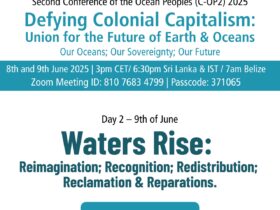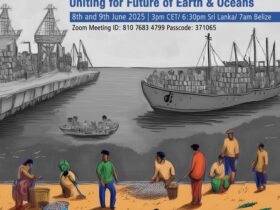Statement of the World Forum of Fisher Peoples (WFFP) – 18 April 2020
In just over three months, COVID19 has changed the lives of all peoples and triggered unprecedented responses from governments across the world. To date, small-scale fishing communities have not been heard in the conversation on how to respond to COVID19. In fact, most government responses expose the ongoing failure to support small-scale fishing communities. In WFFP we believe that governments and small-scale fisher movements should together find appropriate response mechanisms for fishing communities.
The deadly effect of the highly contagious Coronavirus and the shockingly poor health systems call for massive support to up-scale health infrastructure and necessary measures to stop the spread of the disease. But it also calls for support mechanisms to protect the human rights of all peoples and in particular to make sure people do not go hungry in times where small-scale fishing and localised food systems are being shut down.
It is with greatest disappointment that we witness the governments’ responses failing to take into consideration the needs and importance of small-scale fisheries. Lockdown of local markets have caused an almost complete halt for small-scale fishing activities in Honduras, Ecuador, Turkey, South Africa, Senegal, Sri Lanka and the Gambia. In other countries like Thailand, Malaysia, Spain, France and Maldives, small-scale fishers can continue to operate but their income is seriously restricted by the lack of customers, competition from the industrial fleets and/or a fall in prices.
The means to enforce social distancing and curfews across the world reflect an era of increased authoritarianism. People in poor communities struggle to get access to food. The military ‘safeguarding’, banning of trade at fish markets in Sri Lanka, police violence in South Africa and the army’s blockage of food or other items in and out of the Lake Turkana region in Northern Kenya are just a few cases illustrating the brutal and authoritarian measures taken by many governments in the world. Ironically, these measures will end up killing more people – by bullets or starvation – than the coronavirus itself. We denounce the militarised response to a health crisis.
Everywhere, women face a double burden as carers, since children are not going to school and extra care is needed to assist their elders. WFFP members from across the world also report on other immediate consequences for women. In Malaysia, women in the tens of thousands have lost their livelihoods as processing and marketing has come to a complete halt. In Thailand, where fishers have started to sell their catches directly to customers through digital systems as a response to the social distancing measures, women are cut off from processing and selling activities. In South Africa, women who have part time work in other sectors (e.g. tourism) have been sent home without any compensation. In Sri Lanka, women are suffering from increased domestic violence, food insecurity and lack of access to medicine and health services. Governments should do more to end violence and discrimination against women especially now.
The lockdown of small-scale fishing and local markets affects the people directly involved in the value chain of small-scale fisheries and the millions of people who depend on fish as a healthy and affordable protein all over the world. Furthermore, the generally informal character of the small-scale fishing sector renders fishing communities even more vulnerable as relief mechanisms are geared towards the formalized economy and the industrialised food system. At its core, such responses deepens the power-imbalances between the industrialised food system and transnational corporations on the one hand and small-scale food producers on the other.
In this time of deepening crisis our responses have to address the underlying faults in our food system, where supermarket chains and industrialised food production are perceived as the savior. Instead we must build localised solutions. The recipe is simple. One the one hand, governments must stop extending political and economic favours and pouring money on the large-scale industrialised food system. On the other, governments should direct support towards small-scale fishers (and other small-scale food producers) and their localised food systems, building on the principles of food sovereignty. We remind our governments about the values and principles of food sovereignty in small-scale fisheries and call on governments to:
- value food providers and support the localised food system that provides healthy and nutritious food for masses of peoples at affordable prices.
- provide support to improve the quality of products and working conditions, including improvement of sanitary and health conditions in the small-scale fisheries sector.
- work with fisher organisations to strengthen the local democratic control over land and water resources and to find appropriate measures to stop the spread of the coronavirus.
The importance of access to healthy and nutritious food cannot be over emphasised. The isolation of communities from the outside world hinders access to food, and creates fear and panic before starvation is bound to set in. Even in countries and regions where food is available in abundance, longer travel distances to supermarkets and price increases makes it impossible for masses of people to purchase basic food items. We demand from our governments to guarantee access to food for everyone, especially isolated and marginalised communities and those who are disproportionately affected by the current crisis such as small-scale fisherfolks and their families.
We remind our governments about the International Guidelines on Securing Sustainable Small-scale Fisheries, endorsed by the FAO Committee on Fisheries in 2014 – with emphasis on the states’ responsibility to promote the human rights based approach and ensure participation of fisher organisations in decision making. In this acute health, social, environmental and economic crisis, we reiterate that we small-scale food producers are not only central to food production but also have to be at the center in policy- and decision-making.
We stand committed to work with governments to find lasting, just and sustainable solutions to manage this multi-dimensional crisis. In so doing we will be on a better footing to achieve food sovereignty in the near future.
Let’s bring COVID-19 and all forms of injustice to an end!
Issued by:
Nadine Nembard (General Secretary), Christiana Louwa & Moises Osorto (Co-chairpersons)
For the World Forum of Fisher Peoples (WFFP)





Very encouraging to see a fairly accurate assessment of the problem! Now let’s take this opportunity to work together to form a just economic architecture from the ashes of the collapsing globalized economy. Many national and international farmers groups are working with Schiller Institute to do that just now.